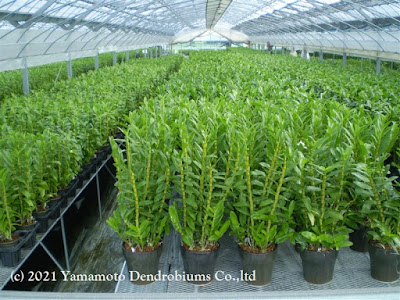Our Dendrobiums realizes high productivity and low cost.
 |
There are many types of dendrobiums: Dendrobium nobile, Den. phalaenopsis, Den. superbum, and others. YAMAMOTO DENDROBIUMS are selected nobile types, most of which are tetraploids and hybridized by Jiro Yamamoto. Besides beauty and quality, YAMAMOTO DENDROBIUMS are famous for long lasting flowers and plants which are vigorous and easy to grow.
The nobile type dendrobiums are native to Southeast Asia and grow in their native habitat on branches of tall trees in cool areas of high elevation in countries such as India, Burma, and Thailand. They are extremely hardy plants growing in elevations up to 3,000 feet where temperatures may drop to near freezing. In these areas there are two seasons, the dry and the rainy. Although there is hardly any rain for more than four months during the dry season, the dendrobiums still survive.
YAMAMOTO DENDROBIUMS are excellent plants for commercial production because:
1. They are extremely hardy plants. As mentioned above, they can stand extremely cold but not freezing temperatures and yet can also grow in warm to hot climates. Actually, if you keep the potting medium (roots) dry, they can survive temperatures down to 32 F (0 C). Since nobiles are so hardy and easy to grow, they are extremely easy to market commercially and should be in great demand by average consumers. In Japan, dendrobiums are sold mostly in December, January, and February - the coldest months of the year - and are kept and grown by consumers in rooms where they usually stop heating at night.
2. They have very attractive flowers in many sizes, shapes, colors, and color combinations, as well as many sizes of plants. They can be used in many ways such as for pot plants, cut flowers, and corsages.
3. The plants grow upright and require less space. More plants can be grown in a given area which lowers the cost of production. Heating is recommended for faster growth. The production cost per plant including heating is an important factor for commercial growers.
4. The conditions for initiation and development of flower buds are known. Therefore, the flowering season can be made to coincide with holidays such as Christmas, New Year, Valentine’s Day, Easter, or Mother’s Day.
5. Our dendrobiums are all selected mericlones. We have many varieties for pot plants. They have been selected not only for their beauty but for commercial cropping. YAMAMOTO DENDROBIUMS all have flowers which last from one to two months (in cool environments) and provide the customers their money’s worth. In comparison, flowers of older varieties of nobile type dendrobiums last only about two weeks.
To begin with, you should be aware that in their native habitat nobile type dendrobiums are epiphytes which grow on trees in full sun with good air circulation provided by breezes. To successfully flower nobile type dendrobiums:
1. Provide plenty of light. High light gives better growth and more flowers.
2. Provide good air circulation. As long as you have breezes or good air circulation, you can prevent leaf burn even when plants are grown in strong light. Growth will be excellent.
3. Do not fertilize too much, especially with nitrogen. The most common cause of poor flowering or production of off shoots is the accumulation of too much nitrogen from fertilizers. Nitrogen should be given only as a trigger for new shoot growth. Once the new shoot has started to grow, it is too late to apply nitrogen. The ultimate size of new cane has been determined at this point. Therefore, do not apply nitrogen after August or sometimes in late July. Slow release fertilizer is not good for flowering size plants. In nature, nobiles attain a certain size every year without supplemental fertilizer.
4. Provide proper temperature for flower bud development. By controlling the temperature, you can control flowering. After canes have completely matured (when tips of cane become round and hard) expose plants to temperatures below 57 F (14 C) 25 nights each night for a minimum of one hour. Flower buds will be initiated and plants will bloom within 50 days if kept at temperatures above 64 F (18 C) at night and 77 - 82 F (25-28 C) during the day. If the temperature is kept lower, plants will flower later.
5. As long as flower buds are initiated, flowering can be regulated by controlling the temperature.
6. Try our special technique which is highly successful in Japan of potting two or three plants (sometimes more) in a beautiful container to produce a magnificent flowering plant.
The following are two practical ways for you to handle YAMAMOTO DENDROBIUMS (Please refer to “Culture Cycle for Nobile Type Dendrobiums” below):
PLAN A: Order mature or nearly mature plants from our nursery in Hawaii. After plants mature, expose to cold temperature below 57 F (14 C) for 25 nights and then control subsequent temperature to flower plants to coincide with right season for sale. This plan is recommended for cold treatment. This plan is better than to start from small plants which require more than 18 months to flower.
PLAN B: Order plants which have been pre-cooled at our nursery in Hawaii about 50 days before desired blooming season. Grow plants at proper temperature for flower bud development. This plan is best for persons who wish to handle the plants for as short a period as possible and will work for growers in any location. It is best to ship plants when the flower buds are still small. Large buds are more sensitive to environmental change and also more prone to damage when shipping. The price of plants for Plan B is a little more than that of Plan A.
We have an established reputation for superior quality. Please do not hesitate to make further inquiry.


